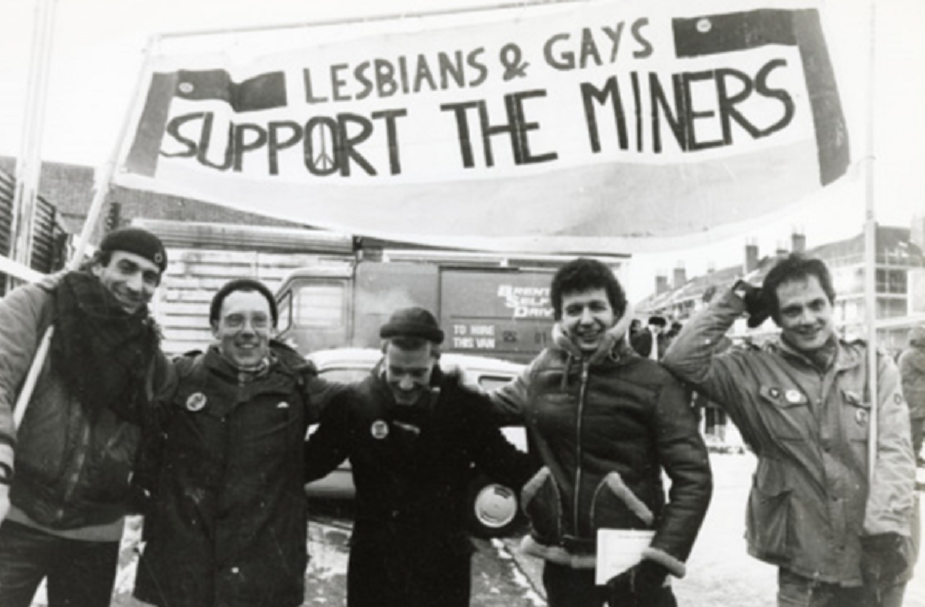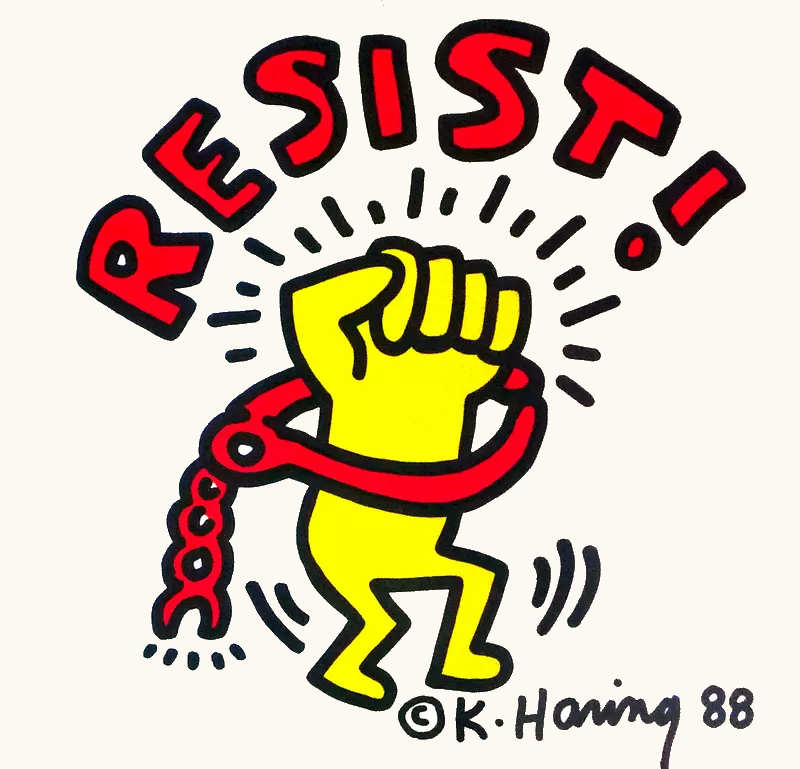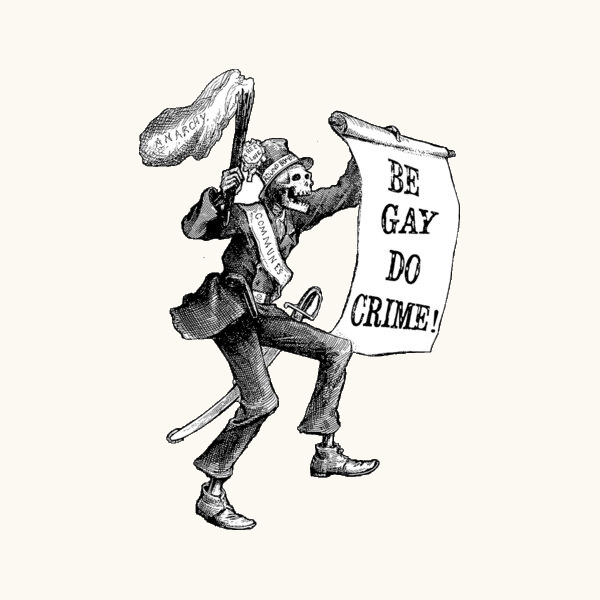We have added a printable version!
Intro
This is written for the thousands of queer radicals in this country, who are rightfully angry, horrified, traumatized by the turn towards a genocide of queer people by a growing fascist tendency. Who are frustrated at the way our ‘community’ continues to mire itself in petty disagreements and petty issues, as church and state organize to destroy our rights and public existence. We are seeing fascists working to violently shove queerness back into the closet, using state force to bring our civil rights to a pre-Stonewall level. They do this because we are a threat to them, but they can do this because we are disorganized, fragmented, and alienated. To fight this we need to change ourselves and change our community. We need to build a fighting queerness and organize our social circles. Ultimately we need to accept what we, as queer people, are: the vanguard of the working class.
In this pamphlet I seek to explain the situation our community is in, why we are so fragmented, and propose that the way to resolve this is through developing new political collectives as the start of building a fighting queer community.
Our Situation
It is plainly obvious that queer people are, alongside people of oppressed nations, the objective vanguard of the US working class. They are disproportionately politicized and have played a vastly disproportionate role in the movements which have arisen in the last decade.
It is for this reason that the right has attacked us in the last two years. From personal attacks on anyone willing to be Out in public to the transphobic and hateful laws being passed in every Republican-controlled state, queer people are under attack by a right that is increasingly eager to entrench the USA’s minoritarian rule. This has challenged rights we previously considered to have been permanently won–and you, among others, are likely desperately looking around for some way to stop this.
This desperate searching manifests in a million different ways and through the channels we have available to us. We all know an Instagram warrior, we all know the cycle of adoration and rejection of idols, the bitter intra-community fights, people picking on a target they can do anything about. All of these are symptoms of oppressed people flailing, desperately looking for some outside force to save them, looking to defend themselves, unaware of how to embark on that path themselves.
We are under the gun of encroaching genocide, a well-funded and zealous campaign to destroy our ability to exist in public, to seek and achieve self actualization, to survive as queer people. To stop this we need to unite the queer community towards political ends.

PARTICIPATING IN THE STRUGGLE IS GAY
Queers are often highly politicized because being publicly queer is a choice to question the narratives you were given at birth, culminating in joining an oppressed group. Going through this process produces people whose very existence is a form of agitation against our hetero-patriarchal society. It also produces singularly curious people, which also explains the proclivity among queer people for seeking high-level theoretical knowledge.
Often queer discourses are about the nature of our coalition, of which part of the L + G + B + T coalition has it the worst. Think of the instinctive disdain for cis gay men, or the infinite hairsplitting on forms of sapphic attraction, or the forever war around asexuality. But queerness has always been a political coalition of different groups of people. The spark which brought a variety of different queer groups–lesbians, upper class gay men, street kids, queens–into an alliance was the AIDS crisis, a material manifestation of homophobic violence.
In our current moment, defined as it is by micro-targeted advertising, queerness appears as an individualized identity which exists for us and only us. That is absurd. We can call ourselves whatever we want, but fascists will still attack us using the state to its fullest effect. What we need is a queerness grounded in a militant solidarity, a solidarity that is clear in our friends–other queers, other workers, the imperialized working class, who we may disagree with or dislike but who we need to work with and develop–and our enemies–the Christo-fascists, the patriarchy, and ultimately the capitalist state.
This needs to be connected with another reformulation of queerness. As the AIDS crisis worsened, the narrative that queer people appear not by choice but that we are ‘born this way’ was used as a rhetorical shield. Queer people went from a societal failure, a threat, to an someone who could be comfortably assimilated into our society. This is not to say that there were not monumental struggles in the 2000s and 2010s–it was not even 20 years ago that any homosexual act could lead to one being arrested in much of this country–but the experience of countless people who have been agitated into queerness, and the attacks of conservatives both speak to another narrative. You have heard that queer people are a social contagion, that by being a lesbian school teacher, a flaming gay barista, or a drag queen who reads stories to children, we are ‘tricking’ people into queerness.
Queer people are a social contagion, our existence is an attack on our society’s narratives about sex and gender, because those narratives are bullshit and have only ever been forced through violence. Violence used to keep a gay kid in a quietly sad and unexamined life, violence used to keep trans people at a hyper-exploited edge of society, violence used to keep women in domestic servitude and men in a dumb state of dominance. There is nothing ‘natural’ about our current gender regime, and our existence is proof of that, which is why we are a threat.
We know this when we have helped our friends realize their gender, realize their sexuality. We know this when we call people eggs, we know this when we work to convince our friends who we already know are gay to embrace themselves. Just by existing in the open we erode the patriarchy’s bad deal, but so many queers are already amazing agitators because queerness is agitational. Imagine if we were simply to use that, what a movement of queers could achieve. That is why fascists fear us.
PARIS HAS BURNT: THE FRAGMENTED QUEER COMMUNITY
The “Queer Community” is often talked about as if it is a real, existing thing, but that is not fully true. What exists in every city is less of a unified community and more of a series of interconnected networks of social circles. Friend groups, housemates, artistic collaborators, polycules, or small activist micro-groups show up to community-wide events at venues or Pride marches, but those groups do not coordinate with these venues or marches in any significant way, and ultimately they are the ones who decide to show up or not show up, not the organizers of these events.
This situation is the product of lack of buy-in to official Gay Rights organizations. In a process similar to the degeneration of the Civil Rights movement, as the struggles for broad-based political rights were won (gay marriage, but also the abolition of sodomy laws), the cross-class gay rights movement fractured. Most official organizations you would come across–who host Pride parades, do lobby days, etc, are class organizations of queer business owners or queer employees of big capital, from tech to finance. But because so many of those fights were conducted through legal channels, these NGOs do not have the pull that liberal ‘community organizing’ groups (who are largely funded by big capital) have in America’s internal colonies.
While we have avoided a parasitic relationship with NGOs, the queer community has its own share of weaknesses, particularly escapism and individualism. This doesn’t just refer to our proclivity towards splitting over children’s shows. It also refers to a ‘literal’ escape, to some perfect community free of oppression which can exist within a world defined by oppression. That is absurd. Even at its best, perfect sanctuary communities do not exist because the ‘outside’ is always also ‘within’. Contradictions of class & race also exist within our communities, and harmful ideologies need to be ideologically defeated instead of escaped. A racist society will create racist communes.
Furthermore, because we are so individualized, we are deeply bad at resolving conflict. Our society has ruined a tool which is absolutely crucial for radicals—criticism—by making it a weapon of the powerful against the weak. If you are criticized, it is often by your boss, or the prelude to a breakup, and thus it is easy to see criticism as an attack. But when we perceive criticism as an attack, and when we solely use it as an attack, we foreclose on our ability to make our friends, loved ones, comrades, better. Our community is fantastic at creating tempests in teapots, or in other words, treating disagreement as abuse, because of we experience criticism as an expression of power. But all that happens and continues to happen because we see queerness as an individual identity rather than an identity inherently opposed to oppression and exploitation, and have given up the task of reshaping ourselves.
While these tempests in a teapot rage we continue to ignore the deep segregation within queerness. Because our queer ‘community’ is effectively a network of friend groups that formed inside our segregated and racist society, we end up socializing in segregated ways, struggling in segregated ways, and replicating our society’s racism with a pink veneer. This problem, like escapism and individualism, cannot be fixed through changing our friend groups. It can only be resolved through the transformation of our social circles into political ones. By creating queer political collectives and engaging in political work, we not only build our capacity to defend ourselves against the Christian right, we also equip ourselves to actually resolve the fundamentally political issues within our community.

THE HOMO’S PLACE IS AT THE HEAD OF A MOVEMENT
It is no surprise that so many queer people have become socialist due to their awareness of the way that their gender based oppression emerges from capitalist exploitation. But the theories of most socialist and progressive organizations in the US tells us that in order to be Serious we must leave our “subculture”, must organize “normal people” and not queer people, must shear our connections to our community.
This has always been an effectively homophobic argument, but it is also incorrect. While we must remold ourselves and work to combat our own patriarchal and racist beliefs, our interaction with the queer community is not some grand mistake that needs correcting. Our interconnection is our strength, and shearing that connection does not make for better work, or a better person. Indeed, it just continues the alienation of politics from our day to day lives.
If we are to build a militant queer movement we must move past that alienation and transform our personal circles into political collectives. In our studies we have found that there are two crucial elements to successfully forming a political group
- A social basis for the group: people need to have some kind of community that exists outside of the explicit work of the group, if we want to have an organization that does not feel like a new job.
- A shared strategy, so that we understand why we do the things we do.
Because the queer community is in actuality a network of interconnected social circles, we effectively already have the first item resolved. If we want to transform those circles into political bodies, what is required is the development of a shared strategy. The way to do this is through the development of a study group that aims towards developing a shared strategic perspective, which you can sum up in points of unity. The content of what you read can be anything your group wants; Circles Mag intends to republish pieces that would serve this purpose, such as Organization Means Commitment, Constructive Criticism: A Handbook, or The Tyranny of Structurelessness. What is important here is that the discussion around these pieces be relevant to your lives, and aimed towards making points of agreement and disagreement clear, that these conversations be summed up in points of unity which describe your view of the world, what you hope to achieve, and how you seek to achieve it.
I know, “another reading group?” But these reading groups are really about reflecting on our own experience, mediated by the text, to foster our thinking about the problems in our lives, where they come from, and what we would want to change about it. If we want to intervene in struggles, to go to moments of crisis and talk to oppressed people, to our fellows queers, to other workers, we should have something worth saying. Importantly, the struggles you should intervene in do not necessarily have to be ‘queer’ struggles, because the struggle for queer liberation is not disconnected or separate from other struggles. The struggle for a real queer liberation requires the transformation of the cornerstone of the capitalist-imperialist state, the family. Thus the fight for queer liberation is intimately tied to the universal struggle against oppression and exploitation everywhere. This may seem like an impossible escalation of your task: “was I not just starting a reading group?”. But because we are fantastic agitators at the junction of imperial capitalism, because we are embedded in so many spaces, we can use those strengths to strike at society’s weak points.
Capitalism exists under a state of constant crisis and contradiction, indeed the things that are crises for us are the profits that capitalists and the imperialist state pulls from us. Normally those crises exist for one person, family, or neighborhood. Your boss fires you. Your landlord evicts you. Homophobes beat your partner. But we have also seen moments when those crises spill out, when people see the plight of the oppressed as their own, and when that happens things suddenly move very quickly. The George Floyd Uprising in 2020 was precisely that kind of societal crisis, caused by the death of a handful of people at the hands of the police. What you need is to be at the site of this crisis before it explodes, with an idea of what should be done, which is delivered at the right time.
Being able to synthesize all of your experiences into a political line is one reason to start with a reading club. But we do not arrive at a perfect position without some push and pull, and the other main reason to start with a low stakes reading group is the need to test and grow your collective’s ability to disagree productively. I have seen so many friendships and political organizations that have been absolutely destroyed by our inability to productively criticize each other. By developing our differences in the low stakes space of a reading group, we can model good conflict without the risk of destroying an ongoing project.
While I hesitate to give further strategic advice given that your situation will depend on your context, I have some suggestions on broad potential campaigns:
- If you want to focus your work entirely on the organization of your local queer community, I would suggest picking a material enemy–a local homophobic church, anti-choice organizations, or crisis pregnancy centers (fake clinics used to undermine reproductive choice in blue states). A good issue would be to focus on abortion as a way of connecting the struggles for queer and women’s liberation. I would suggest that you use the age-tested strategy of ‘educate the agitator’, developing talking points and analysis which you teach to people who are interested in this work, and asking them to spread this to their own social circles.
- If you instead want to build a union in a workplace or apartment complex, I would strongly suggest Kurt Marlin’s Nontraditional Unionism.
- If you look at your local scene and see an organization which is doing exactly the kind of work you want to do, you should interact with them and get a sense of if they could accept your collective, and if the way they do the work is the way you would do it. If that is the case, join en masse after talking with their leadership and membership about it.
There are days when I take a walk along the river by my home. During that walk I am suddenly taken by this thought, this insane thought, that through my own deeds and thoughts I have become a small part of the socialist movement. I feel the wind at my back as the hundreds of comrades I have made, the ground on my feet as the millions of past comrades on whose shoulders I stand. It is an exhilarating feeling, and it often lasts but a second, but those moments steel me, and I want that feeling for everyone. What I have described sounds like a tremendous amount of work, and it is. But this work, of building a real community, of fighting against your shared oppression, of being a homo at the head of the movement, is one of the most meaningful things you can do.
Some cursory suggestions for organizing:
- Always reflect and encourage reflection after every meeting you have with people outside your collective.
- Make sure that decision-making happens during meetings, and that all decisions are upheld after meetings in order to prevent the individualist tendency of letting disagreements slide in a meeting and complaining afterwards.
- A meeting is only ever as good as the notes you take on that meeting. Without notes on a meeting, people will forget what they said and agreed to, which will rapidly degrade your work. There is no point when you should not take minutes on meetings.
- If you don’t bring up your politics during your work, your ideas will never spread, and you won’t be able to sharpen your talking points. At all times work to make your politics as explicit as you can in the spaces you are in.
- Continue nurturing social links with and clarifying your politics with every new person who wants to join.
Further reading
- Organization Means Commitment, Grace Lee Boggs
- Tyranny of Structurelessness, Jo Freedman
- Everyday Ruptures, Teresa Kalisz
- Constructive Criticism: A Handbook, Vicky Legion
- Nontraditional Unionism, Kurt Marlin
- Notes Towards the Re-Rioting of Pride, Muhsin Yorulmaz
- Reading Groups and Political Education, Struggle for a New World Editorial Board
- Combat Liberalism, Mao Zedong


